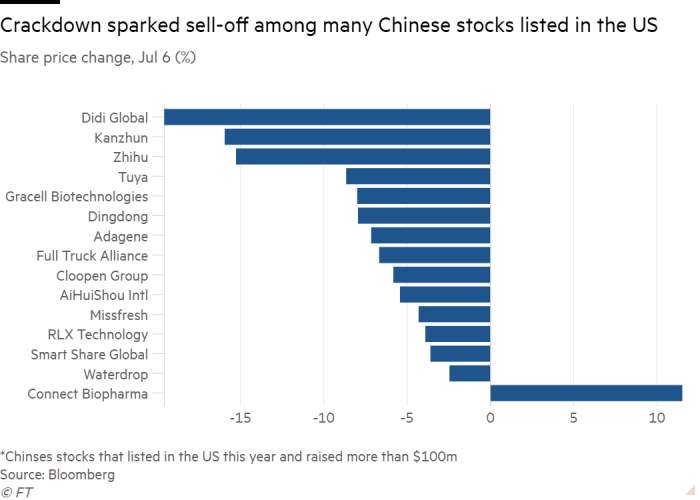Amazon forces rerun of the Jedi
This article is an on-site version of our #techFT newsletter. Sign up here to get the complete newsletter sent straight to your inbox every weekday
Never mind Huawei and other Chinese tech companies, it’s Amazon that has become a threat to US national security, according to its cloud rival Microsoft.
That was its response to losing its big defence department contract on Tuesday. The Pentagon announced it was cancelling the highly sensitive, $10bn joint enterprise defence infrastructure (Jedi) cloud computing contract and would start a new procurement process. It said “evolving requirements, increased cloud conversancy and industry advances” meant the Jedi contract no longer met its needs.
That woolly explanation also omits to mention the legal morass that has delayed the contract. It was held up in 2019, when Oracle, one of the original bidders, appealed against the decision to place only Microsoft and Amazon on the shortlist. Then Amazon appealed when Microsoft won the contract.
Yesterday, Microsoft said the security of the US was more important than any single contract: “When one company can delay, for years, critical technology upgrades for those who defend our nation, the protest process needs reform. Amazon filed its protest in November 2019 and its case was expected to take at least another year to litigate and yield a decision, with potential appeals afterward.”
Government procurement processes are already long and legal challenges only drag them out further, so the Pentagon is wise to be pursuing a multivendor strategy now, where everyone can get a piece of the pie and sole contracts are not challenged in courts. It is seeking proposals from both Microsoft and Amazon and will research whether other companies might be able to fulfil its requirements.
Plenty of tech companies ought to be readying a pitch — defence requirements are increasingly moving towards more tech and cyber capabilities, so Jedi is only the tip of a lucrative iceberg. In its statement, Microsoft listed half a dozen other deals with the US armed forces, including providing the US Army with augmented reality headsets in a contract that could be worth up to $22bn over 10 years.
Meanwhile, Amazon’s beef had been that President Trump’s antipathy towards Jeff Bezos had influenced the Jedi decision. Today, he revealed the extent of his resentment towards three other tech leaders, unleashing class actions against Facebook’s Mark Zuckerberg, Twitter’s Jack Dorsey and Google’s Sundar Pichai for alleged “unlawful censorship” of Americans.
The Internet of (Five) Things
1. Wise’s £8bn UK direct listing
UK fintech Wise has been valued at more than £8bn in a landmark direct listing in London, a rare coup for a stock market vying with Wall Street to attract the next wave of fast-growing tech companies. Wise, which was called TransferWise until earlier this year, provides international money transfer and multicurrency banking services. Over in the US, Planet Labs, the Earth imaging business, has struck a $2.8bn Spac deal to go public.
2. South Korea cools IPO market
South Korean regulators are stepping up scrutiny of big initial public offerings as rich valuations prompt concerns over bubbles. This week’s #techAsia newsletter looks at how the Didi crackdown in China is spreading and we have an explainer on all that’s happening, with the reaction on Wall Street:

3. Samsung chip profits up, German car production down
Samsung Electronics has estimated that its second-quarter operating profit jumped 53 per cent to its highest level in three years on surging chip prices. In Germany, carmakers have warned they will continue to suffer from acute semiconductor shortages in the “medium term”. They cut their 2021 production forecast to 3.6m, from 4m passenger cars.
Daily newsletter

#techFT brings you news, comment and analysis on the big companies, technologies and issues shaping this fastest moving of sectors from specialists based around the world. Click here to get #techFT in your inbox.
4. RNC contractor hacked
The US Republican National Committee is co-operating with law enforcement officials after it emerged that one of its contractors had been hacked, but said that its own data had not been accessed. A Russian state-backed cyber espionage group, linked to stealing emails from the Democratic National Committee in the past, is suspected of hacking third-party IT provider Synnex.
5. Addiction apps tap personal data
Opioid addiction apps used by tens of thousands of people to aid treatment and recovery are accessing sensitive personal information that could be used to identify them, a new study has found.
Tech tools — Nintendo OLED Switch
Nintendo has announced a new version of its Switch games console, featuring a larger and better display, but the unit is not capable of 4K/UHD on a TV, as had been rumoured, reports The Verge. The screen is 7in, up from 6.2in, and features more vivid OLED technology. There is improved audio, an adjustable stand, a wired Ethernet port in the new dock and 64GB of built-in storage, up from 32GB. It will cost $50 more at $350, with availability from October 8. The original Switch will still be sold, but analysts expect it to be phased out.
